Lost Boys of Sudan is a film of genre Documentary released in USA on 24 april 2003
Lost Boys of Sudan (2003)
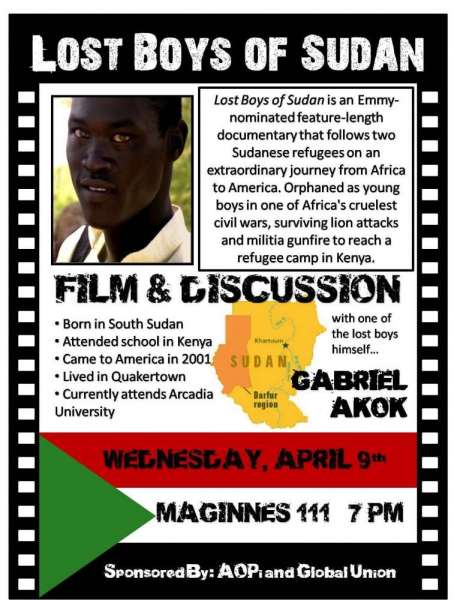
If you like this film, let us know!
Released in USA 24 april 2003
Length 1h27
Genres Documentary
Themes Films set in Africa, Films about children, Films about immigration, Documentary films about law, Documentary films about war, Documentary films about historical events, Documentaire sur une personnalité
Rating74%










Lost Boys of Sudan is a documentary film by Megan Mylan and Jon Shenk about two Dinka boys from Sudan, Santino Majok Chuor and Peter Nyarol Dut, who reached the United States after fleeing the civil war in their country. "Orphaned as young boys" in the Second Sudanese Civil War they "survived lion attacks and militia gunfire to reach a refugee camp in Kenya along with thousands of other children."
The documentary's title “Lost Boys of Sudan” was originally the name given to the group of Southern Sudanese youth by United Nations aid workers who were monitoring their flight from Sudan.
Comments
Leave comment :
Suggestions of similar film to Lost Boys of Sudan
There are 8962 with the same cinematographic genres, 7235 films with the same themes (including 1 films with the same 7 themes than Lost Boys of Sudan), to have finally 70 suggestions of similar films.If you liked Lost Boys of Sudan, you will probably like those similar films :

God Grew Tired of Us (2007)
, 1h26Genres Documentary
Themes Films set in Africa, Films about children, Films about immigration, Documentary films about law, Documentary films about war, Documentary films about historical events, Documentaire sur une personnalité
Actors Nicole Kidman
Rating78%





God Grew Tired Of Us chronicles the arduous journey of three young Southern Sudanese men, John Bul Dau, Daniel Pach and Panther Bior, to the United States where they strive for a brighter future. As young boys in the 1980s, they had walked a thousand miles to escape their war-ridden homeland, and then had to make another arduous journey to escape Ethiopia.
 , 2h2
, 2h2Origin USA
Genres War, Documentary, Historical
Themes Films about children, Films about immigration, Films about racism, Films about religion, Documentary films about racism, Documentary films about law, Documentary films about war, Documentary films about historical events, Documentaire sur une personnalité, Documentary films about religion, Political films, Films about Jews and Judaism, Documentary films about World War II
Actors Judi Dench
Rating76%





Quelques mois avant la Seconde Guerre mondiale, une extraordinaire opération de sauvetage a arraché 10 000 enfants et adolescents juifs au régime nazi. Rapatriés en Grande-Bretagne pour être adoptés, ils durent tisser de nouveaux liens familiaux, supporter les bombardements pour certains, aller libérer leurs propres parents restés en Allemagne. Ils ont tous d'inoubliables histoires à raconter dans ce documentaire.
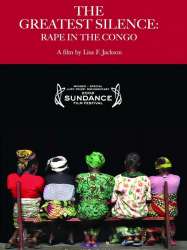 , 1h16
, 1h16Origin USA
Genres Documentary
Themes Films set in Africa, Films about immigration, Documentary films about law, Documentary films about war, Documentary films about historical events, Documentaire sur une personnalité
Rating71%





In 2006, producer/director Lisa F. Jackson travelled alone to the war zones of the Democratic Republic of the Congo documenting the plight of women and girls impacted by the conflicts there. She was "afforded privileged access" to the realities of life in Congo, and found "examples of resiliency, resistance, courage and grace". In a 2008 interview with NPR, Jackson said "I knew going to eastern Congo as a white woman alone in the bush with a video camera that I might as well have landed from a spaceship." Jackson had been a victim of gang rape thirty years earlier, and shared this experience with the survivors she interviewed. Much of the film features these women recounting their stories, which have left them "traumatised and isolated - shunned by society and their families, and suffering life-long health effects, including HIV." Context and background are discussed in interviews with doctors, politicians, peacekeepers, activists and priests. Jackson visits a clinic devoted to treating women with traumatic injury due to sexual violence, particularly cases of vesicovaginal and rectovaginal fistula. In addition, Jackson went out into the bush to interview some of the perpetrators, soldiers who spoke without apparent conscience about the women they had raped, and their often bizarre justifications. "You really can say that there's a culture of impunity in the Congo, where none of these men will face arrest for what they've confessed to me on videotape," Jackson noted. The focus of the film, though, is the stories of the victims, "who just poured their hearts out to me with these stories, including over and over again, please take these stories to someone who will make a difference.
 , 52minutes
, 52minutesOrigin Algerie
Genres Documentary
Themes Films set in Africa, Films about immigration, Documentary films about law, Documentary films about war, Documentary films about historical events, Documentaire sur une personnalité, Documentary films about politics, Political films
In 1939, the end of the Spanish Civil War forced thousands of men, women and children to flee Francoist Spain. The French administration in Algeria opened refugee camps to take them in. Seventy years later, a young Algerian investigates the past. Despite the absence of archives and files, the traces of these camps have survived the collective oblivion and still appear in current Algeria.
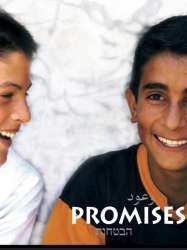
Promises (2001)
, 1h46Directed by Justine Shapiro, Carlos Bolado
Origin USA
Genres Documentary
Themes Films set in Africa, Films about children, Films about religion, Documentary films about law, Documentary films about war, Documentary films about historical events, Documentaire sur une personnalité, Documentary films about politics, Documentary films about religion, Political films, Films about Jews and Judaism
Rating82%





Ce film documentaire donne la parole à sept enfants juifs et palestiniens, âgés entre 9 et 13 ans. Ils donnent leur vision sur le conflit israélo-palestinien.
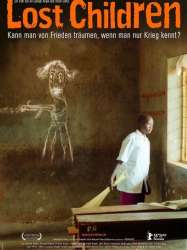
Lost Children (2005)
, 1h37Directed by Ali Samadi Ahadi
Genres Documentary
Themes Films set in Africa, Films about children, Documentary films about law, Documentary films about war, Documentary films about historical events, Documentaire sur une personnalité, Documentary films about child abuse, Films about child abuse
Rating74%






La vita non perde valore (2012)
, 53minutesGenres Documentary
Themes Films set in Africa, Films about children, Documentary films about law, Documentary films about war, Documentary films about historical events, Documentaire sur une personnalité, Documentary films about child abuse, Films about child abuse

The Dream (1987)
, 45minutesDirected by Mohamed Malas
Genres Documentary
Themes Films set in Africa, Films about immigration, Films about religion, Documentary films about law, Documentary films about war, Documentary films about historical events, Documentaire sur une personnalité, Documentary films about religion, Political films, Films about Jews and Judaism
Rating62%





The film was composed of several interviews with different Palestinian refugees including children, women, old people, and militants from the refugee camps in Lebanon. In the interviews Malas questions his subjects about their dreams at night. Through their answers, the film attempts to reveal the underlying subconsciousness of the Palestinian refugee. The dreams always converge on Palestine; a woman recounts her dreams about winning the war; a fedai of bombardment and martyrdom; and one man tells of a dream where he meets and is ignored by Gulf emirs. According to Rebecca Porteous, the film constructs "the psychology of dispossession; the daily reality behind those slogans of nationhood, freedom, land and resistance, for people who have lost all of these things, except their recourse to the last.
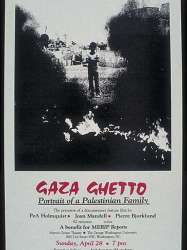
Gaza Ghetto (1984)
Genres Documentary
Themes Films set in Africa, Films about families, Films about immigration, Films about religion, Documentary films about law, Documentary films about war, Documentary films about historical events, Documentaire sur une personnalité, Documentary films about politics, Documentary films about religion, Political films, Films about Jews and Judaism
Rating56%





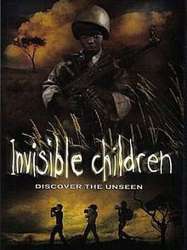
Invisible Children (2006)
, 55minutesDirected by Jason Russell
Origin USA
Genres Documentary
Themes Films set in Africa, Films about children, Documentary films about law, Documentary films about war, Documentary films about historical events, Documentaire sur une personnalité, Documentary films about politics, Documentary films about child abuse, Political films, Films about child abuse
Actors Jason Russell
Rating77%





In the spring of 2003, Jason Russell, Bobby Bailey, and Laren Poole traveled to Africa to document the War in Darfur. Instead, they changed their focus to the conflict in northern Uganda, Africa's second longest-running conflict after the Eritrean War of Independence. The documentary depicts the abduction of children who are used as child soldiers by Joseph Kony and his Lord's Resistance Army (LRA). This film centers around a group of Ugandan children who walk miles every night to places of refuge in order to avoid abduction by the LRA.
 Connection
Connection